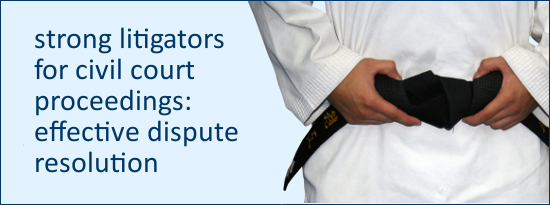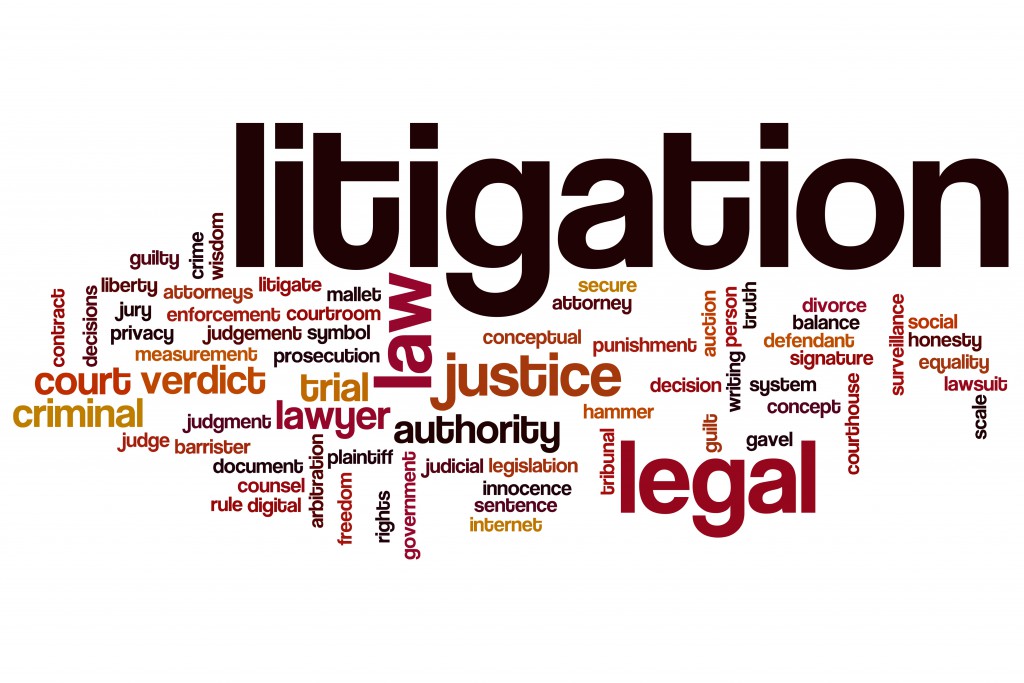We conduct litigation pursuing & defending claims
Litigation, mediation, arbitration solicitors
- negligence
- nuisance
- libel
- infringement of intellectual property breach of contract
- misrepresentation
- judicial review
- unjust enrichment
- trespass
- breach of statutory duty.
We are solicitors addressing UK & international clients’ interests with determination, costs-discipline & direction.
Litigation: an overview
The pre-action stage
Before litigation proceedings are commenced a solicitor will do is identify his client’s circumstances and objectives. For example, the client may be in a dispute with a valuable trading partner, meaning that ways of preserving the relationship between the parties after the dispute need to be considered.
Other points that a solicitor will address at this stage of the litigation include:
- limitation periods (whether the statutory period within which the claim must be brought has expired)
- solvency of the defendant (it is not worth pursuing litigation against a party known to be on the verge of being wound-up or being made bankrupt)
- methods of funding the litigation such as no win no fee agreements
- consideration of available methods of alternative dispute resolution
- compliance with the Practice Direction on Pre-Action Conduct and any relevant protocols (which set out the procedure that parties to litigation must follow).
Procedurally the most important step at this stage is the issuing of a letter before claim (or its equivalent as determined by a “pre-action protocol”), which sets out the nature of the case against the defendant and may facilitate early settlement by providing information early on in the litigation. This should be followed by a letter of response from the defendant.
Commencement of proceedings
Should the dispute fail to be resolved at the pre-action stage, formal litigation proceedings are commenced by issuing a claim form and serving it on the defendant. Either at the same time or shortly after, the claimant must also serve full particulars of their claim against the defendant.
Interim matters
The court will allocate the claim to a track and issue management directions which will function as both parties’ timetable for the litigation going forward. This will give the parties a clear deadline (the anticipated trial date) to which they will be working with various major landmarks along the way, such as the disclosure of relevant material held by both parties and the exchange of witness statements.
It is during this stage of the litigation that the solicitors for both parties will consider making an application for interim orders such as an order to strike out the other side’s case or an order for interim payment into court on account of damages.
The trial
Attempts to resolve the dispute before trial will be considered at various points throughout the litigation but if these prove unsuccessful the claimant and defendant will put their cases to a judge in court. A small claims trial can be relatively informal and parties do not need to comply with the rules of evidence. Fast-track and multi-track trials involve more restrictive rules of evidence and procedure. At the end of the trial the judge will make a ruling as to costs and the general rule is that the loser will pay the winner’s costs of the litigation.
Post-trial
After the trial one party may decide to lodge an appeal. There may also be a hearing before a costs judge (known as a detailed assessment) to determine the amount of the winner’s costs. In most cases the loser of the trial will comply with the judgment against them. If they do not, the winner will consider methods of enforcing the judgment such as through the use of bailiffs. It is prudent to consider the possibility of difficulties arising at this stage before litigation is commenced.
Alternative dispute resolution
Arbitration
Arbitration involves an independent third party (or parties) reaching a decision which is binding on the parties in dispute and enforceable as if it were a judgment. Arbitration clauses are frequently contained in business contracts and where this is the case the parties are compelled to use this method of ADR before contemplating other methods.
Alternatively the parties can volunteer to submit to the process. It can offer a number of advantages (though its appropriateness needs to be assessed on a case-by-case basis) such as relative speed compared to litigation, privacy, the ability to select an arbitrator with expertise in the relevant field and the possibility of coming to a solution that is more practical than a trial judge could impose.
Mediation
In mediation a neutral third party, the mediator, assists two or more parties in order to help them achieve an agreement on a matter in which they are in dispute. Mediation is now widely recognised in the UK & Europe as the most popular form of alternative dispute resolution as it offers solutions beyond those that a court could ordinarily impose and can be used to settle disputes in a whole range of situations.
Mediation is a voluntary process and will only take place if both parties agree. Both parties share the cost of mediation, which will depend on the value and complexity of the claim. If the parties are unable to reach an agreement, they can still go to court, and anything discussed at the mediation is completely confidential.






